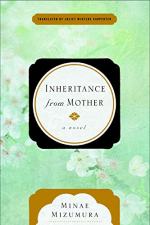|
This section contains 904 words (approx. 3 pages at 400 words per page) |

|
Inheritance From Mother Summary & Study Guide Description
Inheritance From Mother Summary & Study Guide includes comprehensive information and analysis to help you understand the book. This study guide contains the following sections:
This detailed literature summary also contains Quotes and a Free Quiz on Inheritance From Mother by Minae Mizumura.
The following version of the novel was used to create this study guide: Mizumura, Minae. Inheritance from Mother. New York: Other Press, May 2, 2017.
The novel, Inheritance from Mother by Minae Mizumura, depicts the struggle as sisters Mitsuki Katsura Hirayama and Natsuki Katsura Shimazaki try to make their mother’s final years pleasant and comfortable, despite their mother’s negativity and their strained relationship with her. Because Natsuki is the older daughter, she has had to care for both her mother and father in their old age. Mitsuki still harbors resentment against her sister because their parents always favored Natsuki. Mitsuki also is angry with her mother for abandoning their father for another man when their father was dying. Regardless, Mitsuki felt as a Japanese daughter, it was her responsibility to care for her mother despite how badly she wanted to cut ties with her self-centered mother.
The novel opens with Mitsuki and Natsuki just after the death of their mother. Mitsuki imagined that the financial inheritance would give her some relief from the demands of work and allow her to take care of herself. The sisters, in their mid-50s, were tired and physically ill after the demands of caring first for their dying father and then their mother in her final years. Both had families and careers of their own.
The author the provides background on Mitsuki and Natsuki's lives. Natsuki, the eldest, had always been the favored daughter while the girls were growing up, but when she and her mother had an argument, the mother, Noriko Katsura, gave Mitsuki control of her finances. After this point, Mitsuki also was in charge of her mother’s care. Mitsuki was already angered by the way her mother had treated her unfairly as a child. It did not help matters that when Mitsuki’s father became sick, Noriko put him in a public extended care hospital and began seeing another man. A part of Mitsuki wanted to treat her mother the way she had treated her father, but a part of her wanted to see to it that her mother had the best care and all the luxuries she wanted in her older years. Noriko did not make Mitsuki’s job easy because she was demanding and resentful in her old age.
After Noriko’s death, Mitsuki stayed at Hôtel du Lac in order to decide what to do about her husband, Tetsuo, who was having an affair with a younger woman. Mitsuki learned about the affair nearly a year prior but had been so busy with taking care of her mother that she had not been able to attend to her own life. While at the hotel, Mitsuki decided to divorce her husband and live on the inheritance her mother had left her.
Mitsuki’s experience at the hotel was life-changing in that she met other extended stay guests, one of whom a psychic indicated might try to commit suicide. One by one, Mitsuki learned the harrowing stories of the lives of the other guests. One elderly couple worked hard all of their lives only to find themselves bankrupt after a family member defaulted on a loan on which they were cosigners. A mother and daughter in the hotel had no hope for the future because the daughter had a brain disorder and the mother was on the verge of a nervous breakdown trying to care for her daughter and her parents. A man mourned the loss of his young wife to cancer. All of them had suffered situations that might cause them to lose the desire to continue living, Mitsuki included.
While at the hotel, Mitsuki also had the opportunity to try to determine what had made her mother the self-centered person that she had become despite the stereotype that Japanese women of her age were quiet and non-demanding. Mitsuki remembered the story of her grandmother, a woman who believed that the serial novel The Golden Demon, was written about her life. This belief caused the grandmother to leave her first rich husband and live with the man who became Noriko’s father. Noriko’s parents were never married, so Noriko bore the stigma of being illegitimate. Mitsuki believed her grandparents spoiled Noriko in an attempt to make up for the impact their decisions had on her life. Mitsuki came to the conclusion that she was “the offspring of a serial novel” (316) and might never have existed if the serial novel printed in the newspaper had not impacted her grandmother so strongly.
Before leaving the hotel, Mitsuki contacted her husband to tell him she wanted a divorce. She intended to use her mother’s inheritance to buy herself an apartment and do whatever work she needed to in order to support herself. To her surprise, Mitsuki’s sister, who was married to a rich man, offered Mitsuki part of her inheritance. Natsuki knew that Mitsuki had been given most of the burden of caring for their mother, and that she had not been treated fairly as a child, and wanted to make up for how unequal things had been. Mitsuki moved into a nice apartment from which she could see the cherry trees blooming. Instead of continuing to teach, a job she had never liked, Mitsuki decided to set herself to translating a favorite novel from French into Japanese, a project she believed would give her life meaning.
Read more from the Study Guide
|
This section contains 904 words (approx. 3 pages at 400 words per page) |

|



